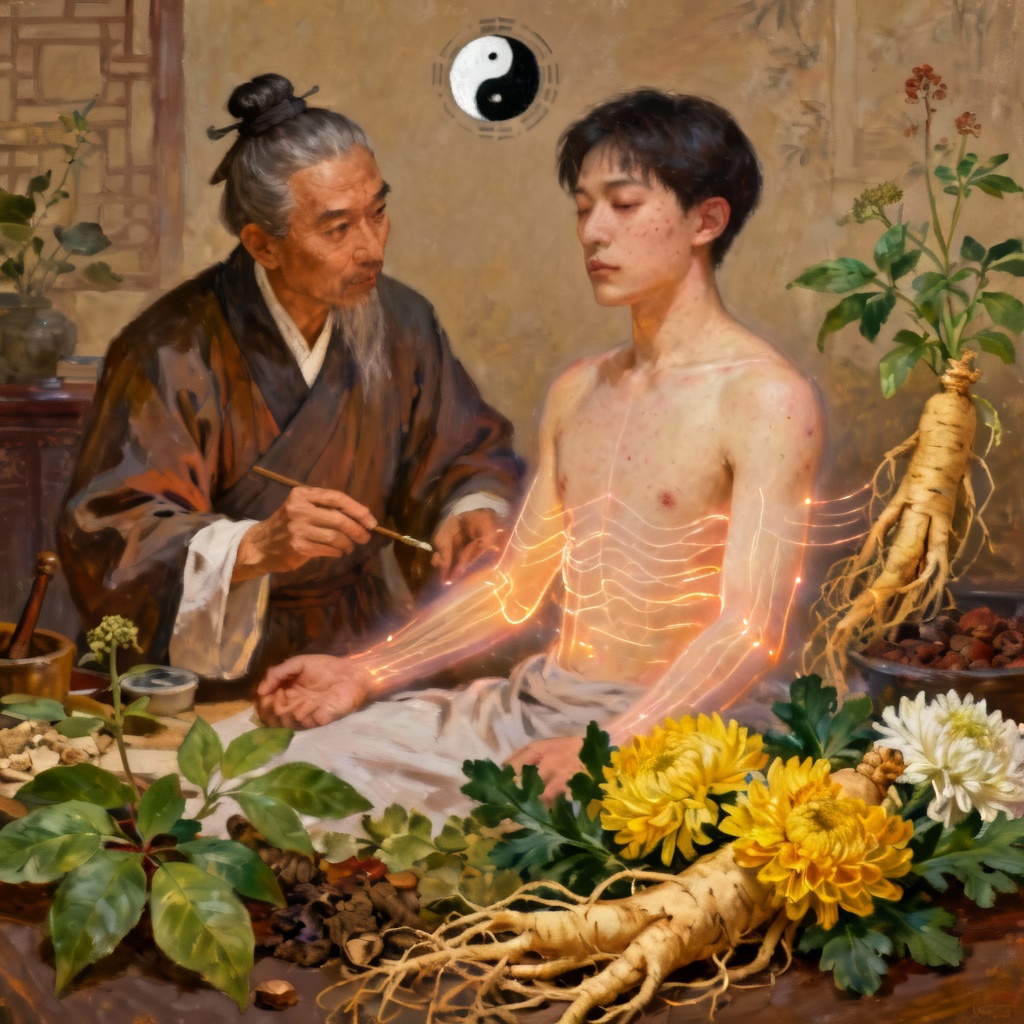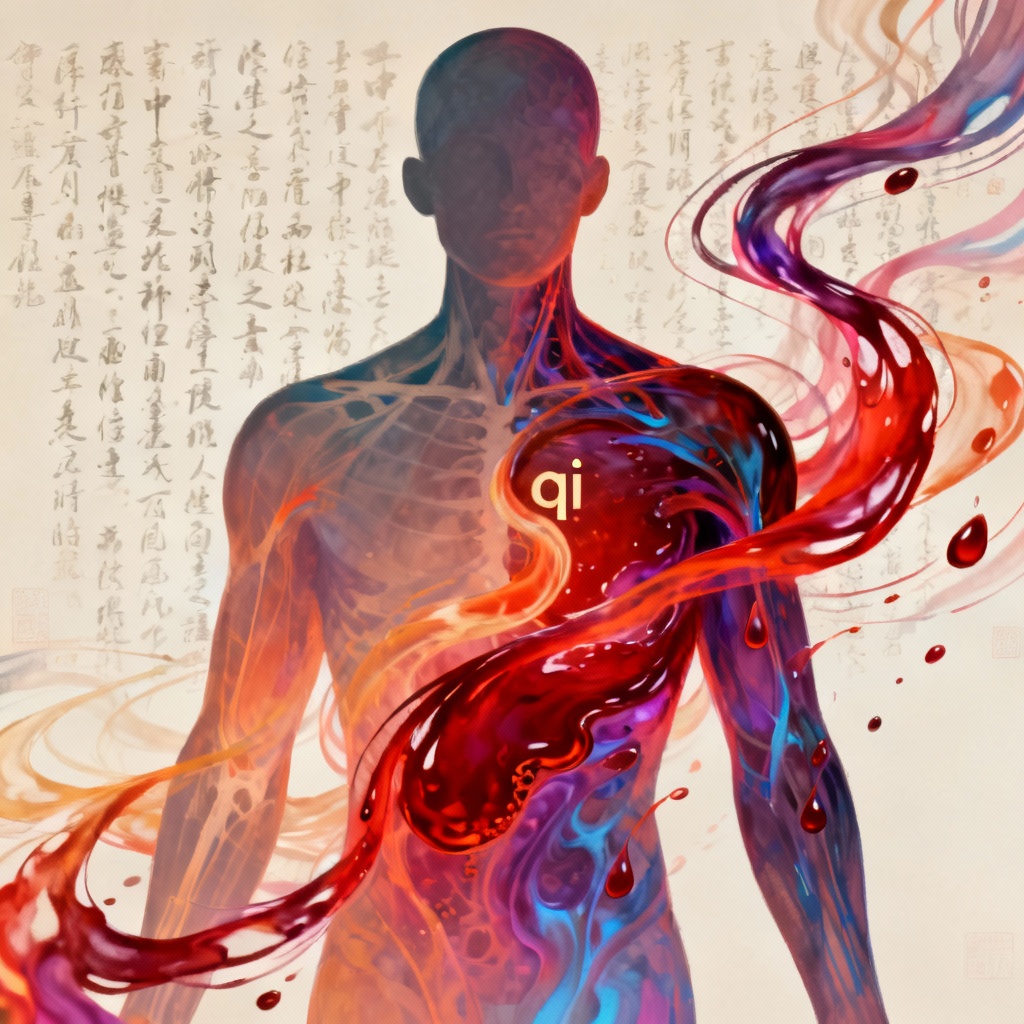Unpacking Anemia: A Deep Dive into TCM’s Unique Perspective
Traditional Chinese Medicine (TCM) views anemia fundamentally as “Blood Deficiency.” This differs significantly from the Western medical focus on low red blood cell counts. TCM’s Blood Deficiency covers a complete imbalance in how qi and blood are produced. It also affects how these vital forces circulate and function within the body, impacting overall health. Many struggle with low energy. Understanding TCM’s perspective on Qi and Blood offers profound insights.

Grasp the Concepts: Understanding Deeper Meanings
In TCM, “Blood” means more than just physical blood cells. It also represents the nourishing and moistening functions throughout your body. Blood delivers vital nutrients, hydrates organs, and supports mental clarity and spirit. When Blood production declines or its quality lessens, Blood Deficiency symptoms appear. These often manifest as what modern medicine calls anemia. Blood Deficiency can feel like your body’s irrigation system is running dry.
Energize Your Flow: Understanding Your Vital Forces
TCM emphasizes that “Qi is the commander of Blood, and Blood is the mother of Qi.” Qi powers the circulation of Blood throughout your body. In turn, Blood provides the essential material foundation for Qi. Anemia TCM patients often experience Qi Deficiency, showing as fatigue and shortness of breath. This lack of Qi also hinders new Blood production. This creates a state known as Qi and Blood Deficiency, like your internal battery running low. It clarifies why those with anemia often feel weak, beyond just low hemoglobin levels. This intricate relationship between vital energy, nourishing fluids, cellular health, and overall well-being is central to understanding anemia TCM.
Understanding Anemia: Discovering Your Unique TCM Type
Strengthen Your Core: Optimizing Digestion for Health
The Spleen and Stomach Weakness type is very common. In TCM, the Spleen and Stomach are sources of Qi and Blood creation. Weakness here means insufficient Blood production for your body. Symptoms include a pale yellow complexion and poor appetite. You might also experience abdominal bloating, loose stools, and persistent fatigue. Your tongue might look pale with a thin, white coating. Learning about spleen-strengthening foods can be a great first step.
Calm Your Mind: Balancing Heart and Spleen Energy
Heart-Spleen Deficiency often affects those who overthink or work excessively. The Heart manages blood circulation, and the Spleen produces blood. When both are weak, it leads to anemia. Symptoms can include heart palpitations and insomnia. You might also have forgetfulness, vivid dreams, a pale complexion, and light periods. This imbalance is like your body’s control center and production line both running slow.
Rejuvenate Your Essence: Nurturing Liver and Kidney Health
Liver-Kidney Yin Deficiency often appears in chronic illnesses or in older, weaker individuals. The Liver stores Blood, and the Kidneys store Essence, which are closely related. Symptoms include dizziness and ringing in the ears. You might also feel lower back and knee soreness. Other signs are hot flashes in palms, soles, and chest, plus irregular menstruation. Yin Deficiency can feel like your body’s cooling and nourishing fluids are running low, causing an internal ‘dry heat.’
Kindle Your Inner Fire: Warming Spleen and Kidneys
Spleen-Kidney Yang Deficiency is common in advanced chronic diseases or with constitutional weakness. Insufficient Yang energy means the body lacks power to create Blood effectively. Symptoms include feeling cold, especially in the limbs, and swelling. You might also experience loose stools and decreased sexual function. Yang Deficiency is like your body’s internal furnace burning too low.
Restore Your Balance: Addressing Acute Blood Loss
Excessive Blood Loss can result from acute or chronic bleeding events. These include injuries, surgeries, or heavy menstrual periods. When blood loss outpaces the body’s ability to create new blood, Blood Deficiency develops.

Empower Your Healing: Essential TCM Treatment Principles
Replenish Your Reserves: Focusing on Blood Nourishment
The main focus is on nourishing Blood. Herbs like Angelica sinensis (Dang Gui), Rehmannia glutinosa (Shu Di Huang), Paeonia lactiflora (Bai Shao), and donkey-hide gelatin (E Jiao) are used. Si Wu Tang (Four Substances Decoction) is a foundational formula. It contains Dang Gui, Shu Di Huang, Bai Shao, and Ligusticum striatum (Chuan Xiong). This formula is often called the “Number One Blood Tonifier.” (PMID 23829037)
Boost Your Vitality: Strengthening Spleen and Qi
Strengthening the Spleen and Qi is also crucial. The Spleen and Stomach form your ‘acquired foundation’ in TCM. Therefore, addressing their function concurrently is essential. Commonly used herbs include Ginseng (Ren Shen), Astragalus (Huang Qi), Atractylodes (Bai Zhu), and Poria (Fu Ling). Ba Zhen Tang (Eight-Treasure Decoction), combining Si Wu Tang and Si Jun Zi Tang, effectively tonifies both Qi and Blood, showing remarkable results. (PMID 28247071)
Sustain Your Essence: Nourishing Liver and Kidneys
For Liver-Kidney Yin Deficiency, nourishing these organs is key. Formulas like Liu Wei Di Huang Wan or Zuo Gui Wan invigorate Yin and supplement Kidneys. These are combined with herbs like Dang Gui and Lycium barbarum (Gou Qi Zi) to nourish Liver Blood.
Kindle Your Inner Fire: Warming Spleen and Kidneys
For Yang Deficiency anemia, warming and tonifying the Spleen and Kidneys helps. Formulas such as You Gui Wan or Shen Qi Wan warm Kidney Yang. These are paired with Li Zhong Tang to warm and invigorate Spleen Yang.
Eat Your Way to Health: Practical Food Choices
Dietary therapy is a cornerstone of TCM, emphasizing ‘food as medicine.’ Recommended foods include red dates, longan fruit, and goji berries for Blood building. Yam and Coix seed strengthen the Spleen. Black sesame seeds and walnuts nourish the Kidneys. Iron-rich foods like pork liver, spinach, and red amaranth are also helpful. Avoid raw or cold foods that might harm your Spleen and Stomach. The Yellow Emperor’s Inner Canon states, “Food nourishes, assists, benefits, and repletion; when properly combined, it boosts essence and Qi.” (Huangdi Neijing, Su Wen Ch. 10)
Live Intentionally: Supporting Your Body Daily
Lifestyle adjustments are also vital. Ensure you get enough sleep and avoid staying up late. Moderate exercise like walking or Tai Chi can improve Qi and Blood circulation. Manage your emotions and prevent excessive worrying. For women, careful menstrual cycle management is important, avoiding overexertion during periods.
TCM treatment for anemia focuses on holistic regulation. It aims not only to raise hemoglobin levels, but also to improve a patient’s overall health state. This comprehensive approach is a unique strength of the TCM Qi-Blood perspective on anemia. Understanding anemia TCM from this ancient viewpoint can unlock significant health improvements.
References
(PMID 23829037: “A review on the traditional Chinese medicine formula “Si Wu Tang” for gynecological diseases” https://pubmed.ncbi.nlm.nih.gov/23829037/)
(PMID 28247071: “Immune-enhancing effects of Huang Qi (Astragalus membranaceus) in combination with Si Jun Zi Tang” https://pubmed.ncbi.nlm.nih.gov/28247071/)
(“The Yellow Emperor’s Inner Canon states, ‘Food nourishes, assists, benefits, and repletion; when properly combined, it boosts essence and Qi.’ (Huangdi Neijing, Su Wen Ch. 10)”)
Quick Self-Check & Self-Help
If you often feel tired, look pale, and struggle with focus → Immediately take 3 deep belly breaths and gently massage Spleen 6 (three finger-widths above your inner ankle bone) for 30 seconds.
Medical Disclaimer:This article is for educational use only and is not a substitute for professional medical advice.